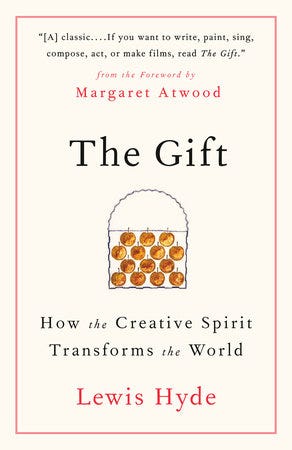Carl Cervone
Notes on the intersection of gift and market economies
November 12, 2021
“In a free market the people are free, the ideas are locked up.” — Lewis Hyde

Lewis Hyde’s book The Gift is a must-read.
It’s a study of gift giving, its relationship to art, and the communities that form around these acts.
“It is the one book I recommend without fail to aspiring writers and painters and musicians.” — Margaret Atwood
How a gift economy differs from a market economy
Hyde describes this clearly:
- In a market economy, there’s an equilibrium state. You exchange goods of equivalent value. You pay to balance the scale.
- In a gift economy, there is momentum. A gift moves energy from one body to another.
Traditional examples of acts in the gift economy:
- Making offerings to a religious deity
- Contributing open source software
- Cooking food for friends
- Babysitting a neighbor’s children
- Mentoring / coaching a youth group
- Serving as a volunteer EMT
- Sharing a poem with a friend
Gifts do not need to move reciprocally.
Gifts do not produce the adversarial roles of creditor and debtor.
Gifts shun accounting and exactness.
Gifts are passed on — the act of passing on a gift benefits both the giver and the receiver.
The gift economy does not operate in isolation from the market
Sep Kamvar writes about this:
When people talk of gift economies, often they talk about them as a replacement for the market economy. But gift economies and market economies have operated side-by-side for much of history.
Web2 social media platforms were successful at creating a gift economy among users.
Users shared and liked things freely.
Then, users woke up to the fact that they were the product. The “gifts” they shared/liked could be monetized and the value accrued to the platforms.
With Web3, the spirit of the gift economy is being ported onto a market economy
Take issuing art/music/writing as an NFT.
It can be shared and enjoyed as usual, but it can also be exchanged for money in a way that rewards both the creator and their supporters.
Airdrops are another example.
Yesterday, 25M ENS tokens was airdropped into certain people’s wallets.
Why? Because those people were early supporters of ENS.
A few cashed in; most kept their gift. Now the tokens are worth around $1B. And the supporters are even more ardent.
Pay it forward
In traditional cultures, it’s taboo to hoard a gift and not contribute something back to the community.
Hyde wrote: “In folk tales, the person who tries to hold onto a gift usually dies.”
Web3 builders and DAOs like ENS are creating powerful incentives to pay it forward and act generously. That’s a message worth spreading.